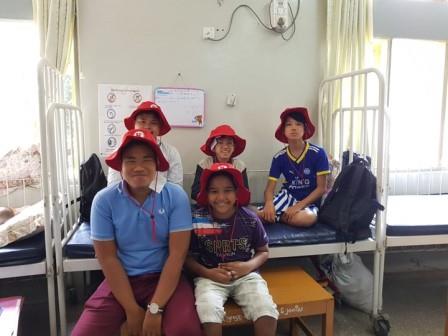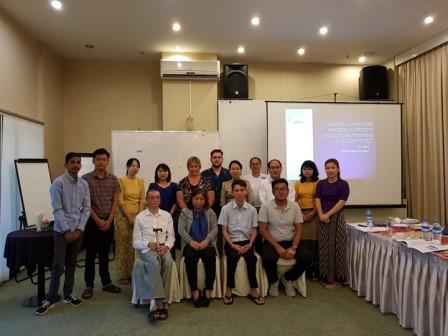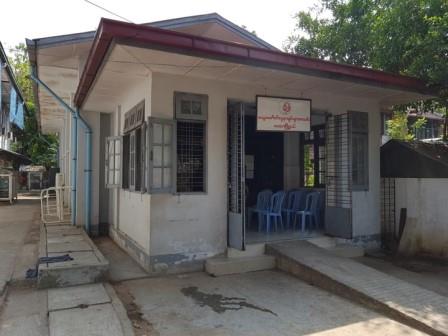Sam’s experiences were originally published in Factor Matters, the newsletter of HFNSW (www.hfnsw.org.au), vol. 40, Winter 2019 and Leonie’s reflections have been published in The Missing Factor, the newsletter of HFV (www.hfv.org.au), Spring 2019. They are adapted with permission.
Sam Duffield is a Haemophilia Foundation Australia Youth Leader
Leonie Demos is a delegate on Haemophilia Foundation Australia Council and President, Haemophilia Foundation Victoria
Sam Duffield and Leonie Demos describe their experiences of representing HFA at the National Member Organisation Twinning Meeting with the Myanmar Haemophilia Patient Association in March 2019.
SAM DUFFIELD
Myanmar, formerly known as Burma, is found between Bangladesh, China, Laos & Thailand, with a population of approximately 55 million. In March 2019 Leonie Demos (HFV President and HFA Council Member) and I represented HFA at a series of meetings in Yangon (formerly known as Rangoon) with the Myanmar Haemophilia Patient Association (MHPA) to discuss the possibility of establishing a World Federation of Hemophilia (WFH) twinning partnership between each of the organisations. We were accompanied by Marie Ann Fernandez who is the WFH Regional Manager for Southeast Asia/Western Pacific.

The WFH Twinning Program aims to improve haemophilia care in emerging countries through a formal, two-way partnership between a patient organisation in an emerging country with a more experienced patient organisation. It has operated for more than 20 years and in that time there have been 215 partnerships across 113 countries. HFA had previously twinned with the Thai Patients’ Club in Thailand from 2008-2011. WFH also has a program for haemophilia treatment centres (HTCs) to twin to help increase access where haemophilia diagnosis, treatment and care is limited because of economic and other circumstances.
Over the course of five days, Leonie and I were introduced to the Council of driven young men and women who are working hard to improve the situation of those living with haemophilia in Myanmar. We also met with doctors at the hospital, which has recently opened a haemophilia treatment centre. We learned more about the difficulties for people living with haemophilia in Myanmar. Their only access to clotting factor is through the WFH Humanitarian Aid Program. Many of the young men cannot work because of their bleeds.
These challenges aside, the MHPA is working hard on behalf of those with haemophilia in order to provide improved access to information, treatment, hydrotherapy and opportunities. The doctors have also developed their expertise though participation in training programs where they could visit HTCs in the UK and learn more about diagnosis, treatment and care.
During our discussions we talked about how the Myanmar group and HFA volunteers might work together to strengthen their advocacy skills so they can represent their needs to other organisations and the government to continue to improve the situation for people with haemophilia.
As with any organisation including our own haemophilia foundations, it’s all about having a strong governance structure and driven leaders, and Myanmar has some very smart driven young leaders, who are looking to do more to help their community.
This is just a short snapshot of my recent trip to Myanmar, so please watch this space as the journey continues. The next step is for the two groups to apply to WFH to be formally recognised as twinning partners.
But this is also a small reminder to the community out there reading this, to be involved whenever possible, because without your involvement, your foundation doesn’t know how to help you. Be involved, because you are not alone, there might not be a lot of us, but we all share a lot of the same experiences and can help each other and continue to improve the situation locally within Australia and globally.

Some young members of MHPA

Leonie and Sam with Marie Ann Fernandez and the MHPA group

The Haemophilia Treatment Centre in Yangon
LEONIE DEMOS
As a mother of a son with haemophilia it has always been a double-edged sword for me. On one side it feels unfair and unjust that we as a family have had to watch him with his challenges in life and the times that pain has been his enemy. However, like most of us I have always been so grateful for the medical care and the support we have in Australia. Challenges are shared with amazing medical professionals and treatments are of a quality that were nothing but dreams to those generations before us. From diagnostics which we take for granted, public transport that is affordable and available to get to hospital if we need to, to government-funded treatment product in Australia, we are confident we will have access to high quality health care every day. This was highlighted again for me during my twinning visit to Myanmar.
Our new friends in Myanmar share a genetic disorder like us. They share a heart and passion to work together to support each other and provide support for the rough times they face. But they have great challenges every day in living with a bleeding disorder and much to do to achieve the level of diagnosis, hospital services and treatment they need to live well.
It is an exciting opportunity to plan for a twinning with Myanmar. They have been making strides ahead both with their haemophilia services and with their Patient Association. Sam mentioned that a haemophilia treatment centre has now been opened in Yangon and that the haematologists have undertaken further training on haemophilia management after an HTC twinning with the UK. The Patient Association has been meeting to discuss planning for future directions with members from both Yangon and the second largest city in Mandalay. They have been working closely with hospital teams to broaden their reach and address isolation issues. They have also had successful events to raise awareness with the public.
Sam and I felt our privilege in every way during our time in Myanmar. We also felt the hope and passion of a group of very special people who want to work together to improve treatment, care and peer support in their country. We have skills and experience to share and together we will work to do what we can knowing all our extended community is behind us.
Watch this space as the twinning takes off and consider the ways you can also step out of our shared privilege and support a beautiful community in Myanmar.
Haemophilia Foundation Australia acknowledges the Traditional Owners and Custodians of Country throughout Australia, the land, waters and community where we walk, live, meet and work. We pay our respects to Elders past and present and extend that respect to all Aboriginal and Torres Strait Islander peoples.
Sign up for the latest news, events and our free National Haemophilia magazine